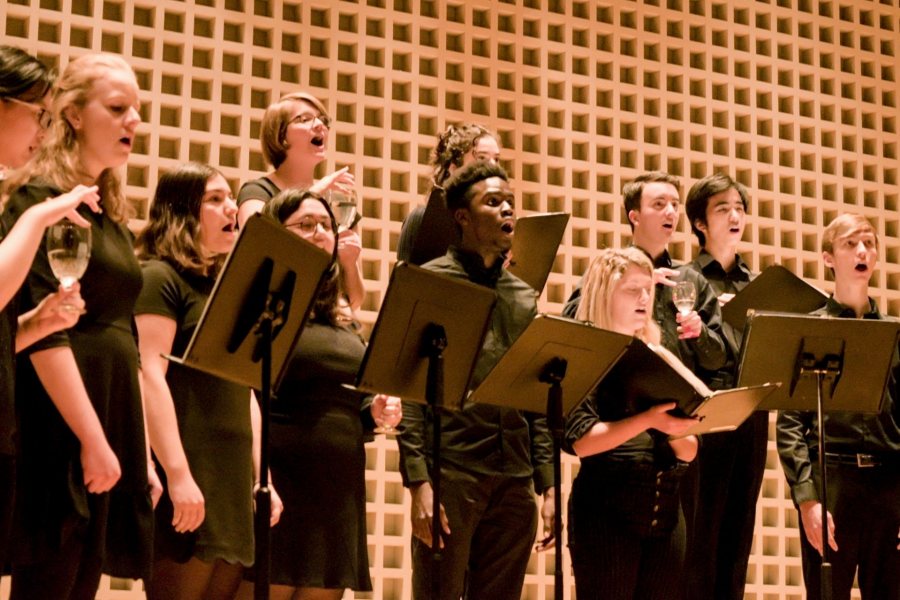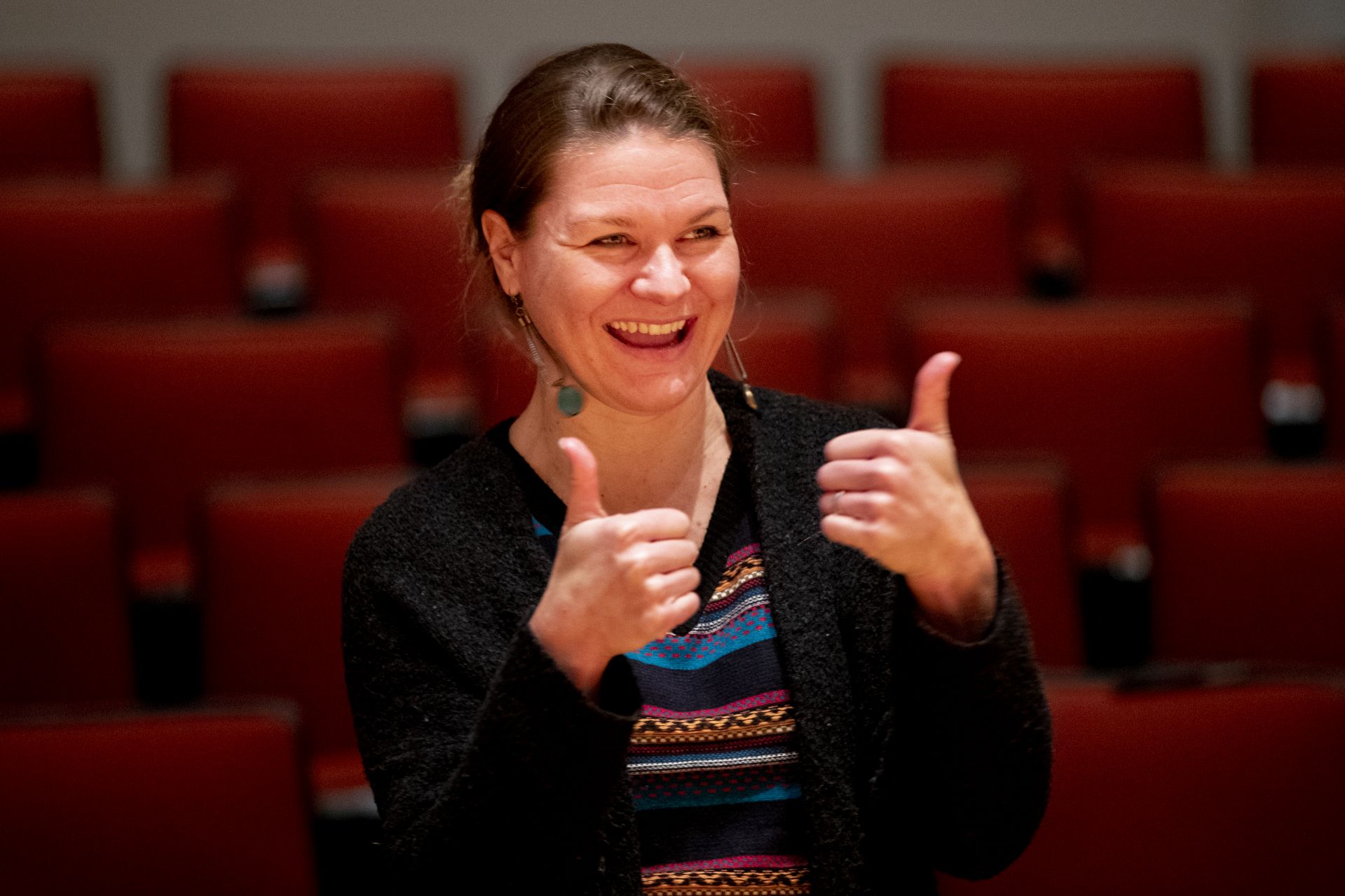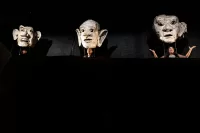
Are you ever tempted to tell a younger person that they can’t sing?
Well, don’t. “They retain that. And then for the rest of their lives, they believe that they can’t sing,” says Joëlle Morris, the new director of the Bates College Choir.
But even so, she continues, there’s hope. “I have yet to find, in a 20-year career, one person who couldn’t sing. Give me a semester, I can teach you to sing on pitch. It’s true.”
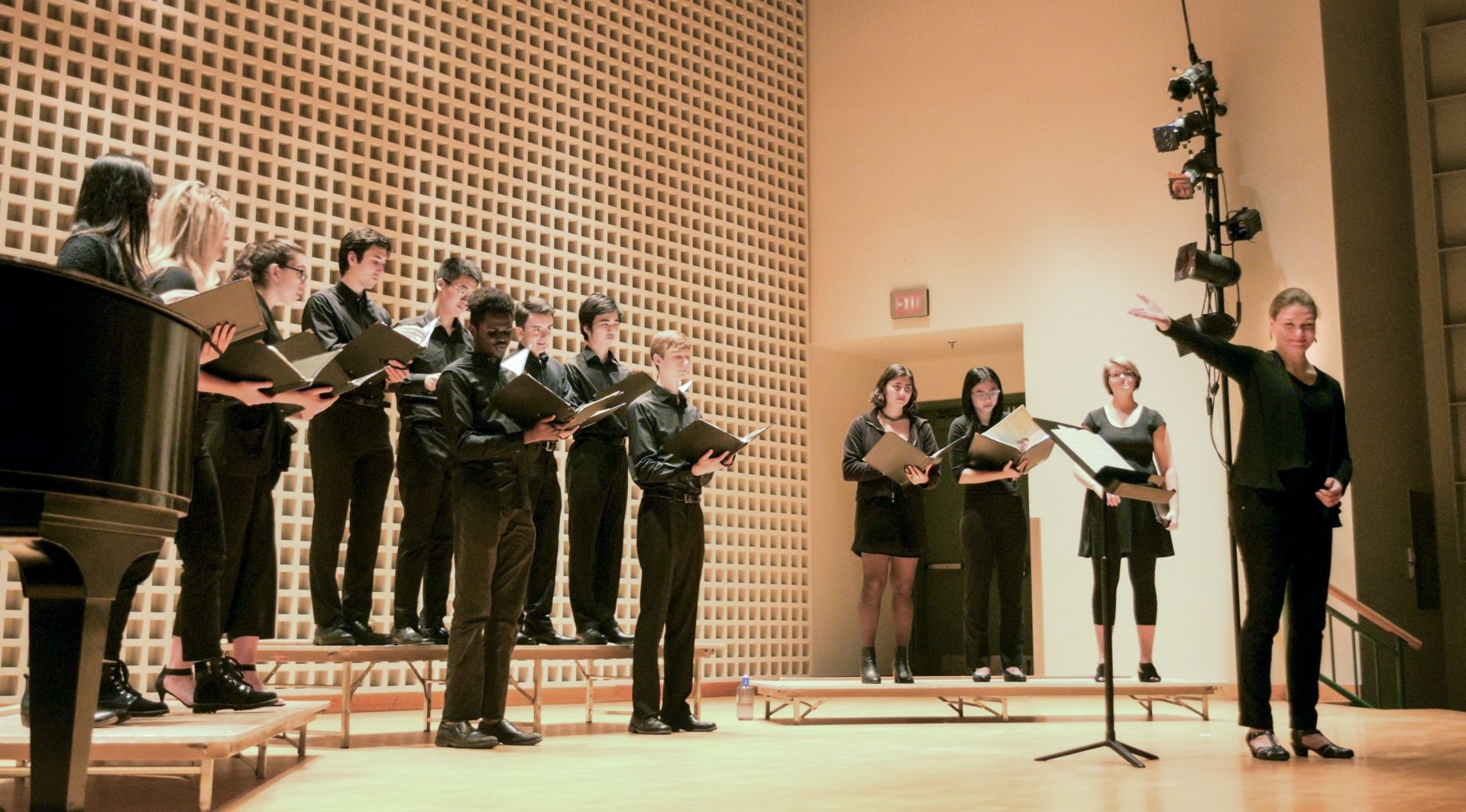
Joëlle Morris, at right, and the college choir during their Nov. 17 Northern Star performance. (Layla Dozier ’21 for Bates College)
In a Nov. 17 concert titled Northern Star, which extolled the glories of nature and the cosmos, Morris made her debut as leader of the Bates choir. She succeeds John Corrie, who stepped away from the choir directorship after 32 years but continues to work with Bates voice students (and to serve as artistic director of the Maine Music Society).
A lecturer in music in her second year at Bates, Morris also works with individual voice students and teaches music theory. Off campus, she directs the CODA Chorus, a community chorus in central Maine. And Morris is a mezzo soprano who sings jazz and classical music, including with two chamber groups she co-founded, the Resinosa Ensemble and the Amethyst Chamber Ensemble.
Her répertoire also includes a evening-long tribute to Edith Piaf, the iconic French chanteuse of the mid-20th century. There’s a logical connection: Morris was born in Evian, France, and has worked extensively in Europe. She attained her academic degrees in the U.S. and moved to Maine in 2011. Morris, her husband, and their children live in the Brunswick area.
In November, we joined Morris in the Bobcat Den to discuss authenticity, core fitness, Beethoven’s birthday, and, yes, Edith Piaf.
You believe quite firmly that anyone can sing.
Everyone has the ability to create music, because that’s how we, as humans, communicate. We’re made to communicate with song, with music. And we don’t have to be American Idol good, because it’s not about that. It’s about sharing your humanity with someone else.
I tell my voice students: Don’t try to sing pretty, pretty is boring. Try to sing with emotion, because people are not going to remember your mistakes — they’re going to remember how you made them feel. If a listener says, “I got chills out of that one,” the chills don’t necessarily come from a pretty voice. They come from an authentic voice.
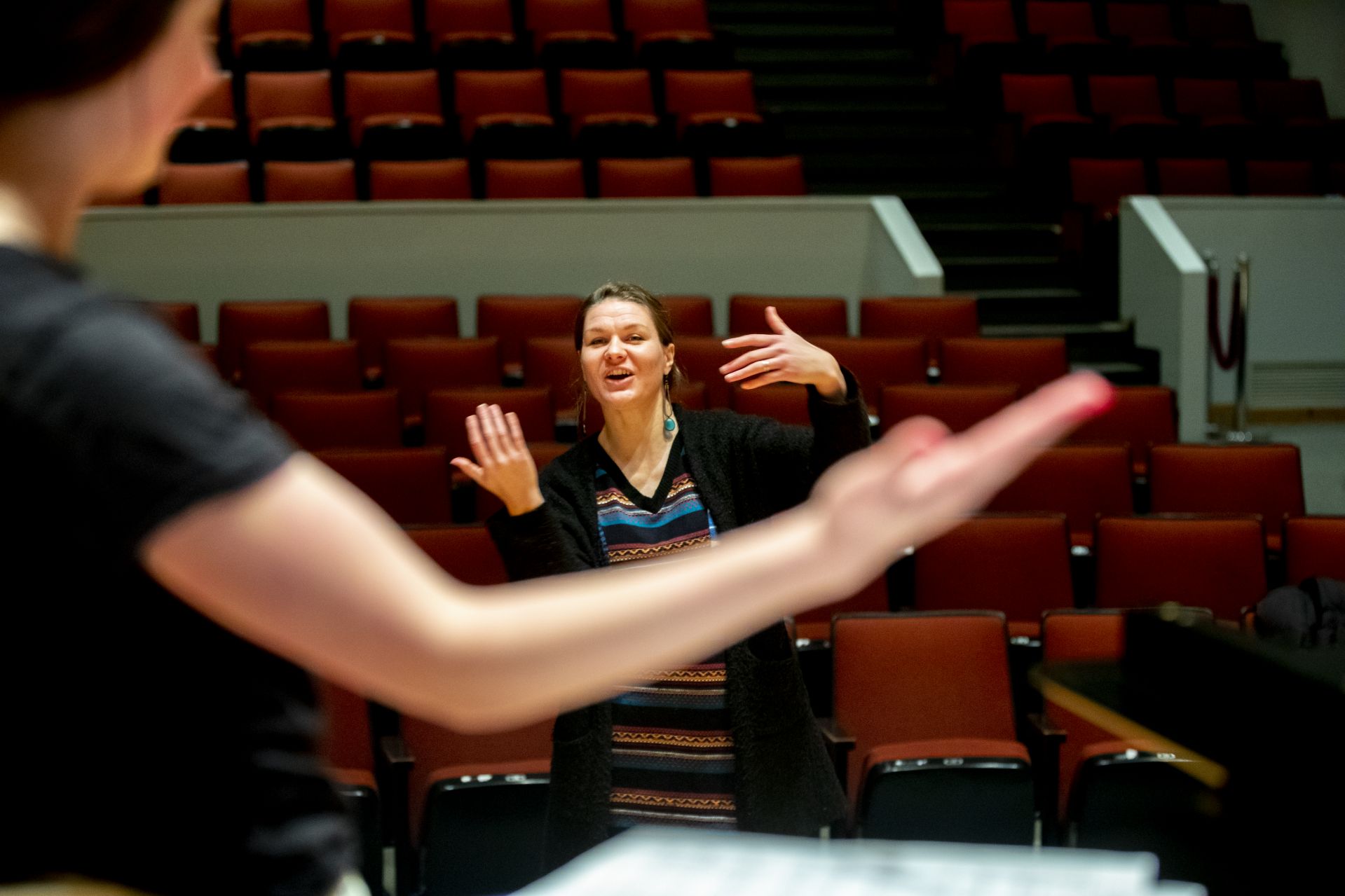
Joëlle Morris models a gesture for “The Willow Song” by Samuel Coleridge-Taylor as she prepares voice student Clara Porter ’22 of Portland, Ore., for an Olin Arts Center voice recital. (Phyllis Graber Jensen/Bates College)
You have degrees in vocal performance from the University of Colorado Boulder and the Lamont School of Music. When did you first become seriously interested in singing?
I started singing in high school because I had a substantial knee injury and couldn’t do sports anymore — and sports had pretty much been my life. So I started putting all this extra energy into choir, and really enjoyed it.
When I got to college, first I was a business major, but for some reason I was put into the musicians’ dorm, which was great. One of my friends, a pianist, dared me $50 to audition for the school opera, which was Madame Butterfly.
And I was like, “I’ve never sung an aria, I’ve never sung Italian, I don’t know anything about this” — but also, “50 bucks buys a lot of ramen noodles.” So I took the bet and I got in the opera as a choir member. And I loved it. So then I switched my major. It was really a lot of work, but I got caught up.
What do you love about directing the Bates choir?
What I love about college students is seeing the growth that happens. Once you get them out of their insecurities a little bit, then they can really bloom in a way that’s just wonderful to see. That’s been really gratifying to see this semester.
Broadly speaking, what do you love about being a musician?
I like the creativity, I like the discipline, I like the collaboration. Especially as a vocalist, you always have a pianist or a chamber orchestra. I really enjoy the sharing of ideas. I did a lot of jazz in Europe, with a trio and then with a big band. That’s really what taught me to listen and collaborate with other musicians.
And that idea of collaboration as well. It’s all these voices together, and we have to learn how to blend and have the same articulation and rhythm and whatnot. So that idea of collaboration really is in the humanity of music.
In France, once when I took over a choir, it was people from lawyers to the butcher next door, to an artist, to secretaries. You get to meet so many people. And of course they want to show you their town and what to do. The easiest way to be part of a community is to join a musical ensemble of some sort.
What surprises students in the choir or studying voice?
They tend to be surprised at how they have to use their body in such a different way — even athletes or dancers, who are used to using their bodies. Singing is just as demanding but in a very different way. It’s like tai chi. You can’t use your body in tension, because the moment your body tenses, your voice tenses, your instrument tenses. You have to learn how to relax, but use your core strength nevertheless.
Singing in choir makes you feel like you’ve done something that’s difficult but attainable. It’s not easy to sing your notes, sometimes in a foreign language, while staying in rhythm and blending with everyone around you. And to use your body as a pump to create this sound, and to look at me flapping my arms around. There’s a lot going on that you have to be engaged in. And once you get used to that, then it gives you a great high.
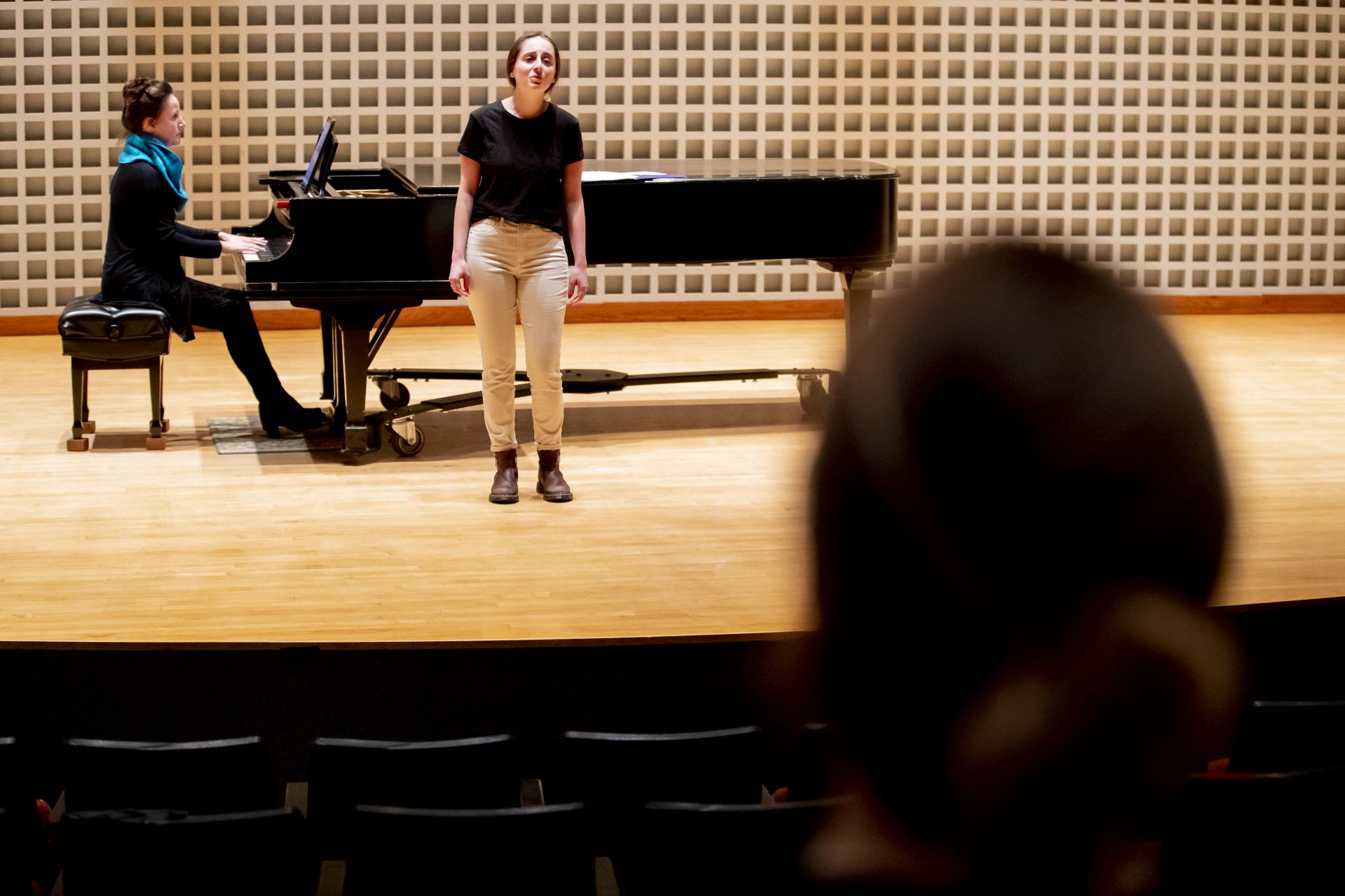
Accompanied by pianist Bridget Convey, Clara Porter ’22 rehearses “Journey to the Past” from Anastasia as Joëlle Morris listens in the Olin Arts Center Concert Hall. (Phyllis Graber Jensen/Bates College)
John Corrie left a pretty big pair of shoes to fill.
I’ve been very, very blessed to have John still here and giving me advice when I need it. It’s not my first choir, obviously, but getting to know Bates, the culture, how it works, “What did you do with your students?” etc. He’s so readily available with answers and advice. We’ve known each other for a while. So that’s been really lovely.
What’s the choir up to next semester?
The first part of the semester is all musical theater, and the students are super excited about that. That concert is right before the February break.
And then, on March 29, we’re doing Beethoven’s Ninth Symphony at the Basilica of SS Peter and Paul here in Lewiston. That’s something that John Corrie put together: We’re doing that with the Bates Orchestra, singers from the basilica and local high schools, and the Maine Music Society Chorale and Orchestra. I think all told, we’ll be close to 100 singers. 2020 is Beethoven’s 250th anniversary.
Many of our readers here in Lewiston know you from the Piaf tribute you’ve done at the Gendron Franco Center.
The Piaf audiences, most of them know these songs, and they’re going back into whatever memory they have of her. But I don’t want to necessarily imitate her, because first of all, you can’t imitate Edith Piaf. So I’m conjuring her up a little bit, but I’m still being me. So it’s that fine line of trying to do both at the same time, knowing that all of this is packed with history and nostalgia.
So I really get into a very different mode with that one. Performing other music, you always look just above the listeners’ foreheads, so it looks like you’re looking at individuals, but you’re not really, because a lot of times, making eye contact with the audience can disturb them and disturb you. But with Piaf, there’s actual real eye contact, and it’s not disturbing, because we’re all just in that same world.
